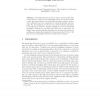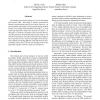49 search results - page 6 / 10 » Warehousing and Analyzing Massive RFID Data Sets |
SOFSEM
2001
Springer
14 years 2 days ago
2001
Springer
Knowledge discovery, that is, to analyze a given massive data set and derive or discover some knowledge from it, has been becoming a quite important subject in several fields incl...
BIBM
2010
IEEE
13 years 5 months ago
2010
IEEE
The emergence of data rich domains has led to an exponential growth in the size and number of data repositories, offering exciting opportunities to learn from the data using machin...
ICASSP
2009
IEEE
14 years 2 months ago
2009
IEEE
Chances to detect assembly activity are expected to increase if the spiking activities of large numbers of neurons are recorded simultaneously. Although such massively parallel re...
VLDB
2001
ACM
14 years 2 days ago
2001
ACM
Business process automation technologies are being increasingly used by many companies to improve the efficiency of both internal processes as well as of e-services offered to cus...
ICDM
2006
IEEE
14 years 1 months ago
2006
IEEE
The ultimate goal of data mining is to extract knowledge from massive data. Knowledge is ideally represented as human-comprehensible patterns from which end-users can gain intuiti...


